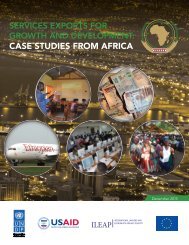BUDGET
budget
budget
You also want an ePaper? Increase the reach of your titles
YUMPU automatically turns print PDFs into web optimized ePapers that Google loves.
82<br />
MEETING OUR GREATEST CHALLENGES:<br />
NATIONAL SECURITY AND GLOBAL LEADERSHIP<br />
current and emerging threats include the Army’s<br />
Aviation Restructure Initiative and the Navy’s<br />
phased approach to cruiser modernization—both<br />
of which require congressional support.<br />
In modernizing its health care system, the<br />
Department will simplify TRICARE—the<br />
health care program of the Military Health<br />
System—while adding choices for beneficiaries<br />
and encouraging the use of existing military<br />
treatment options.<br />
The Budget reduces overhead and waste,<br />
such as through continued reductions to DOD’s<br />
major headquarters and the establishment of<br />
Service Requirements Review Boards across<br />
the Department to identify further efficiencies<br />
and cost-savings. The Budget also requests that<br />
the Congress authorize another round of Base<br />
Realignment and Closure (BRAC), which is critically<br />
important to re-align resources currently<br />
consumed by main taining unneeded facilities.<br />
The need to reduce excess facilities is so critical<br />
that, in the ab sence of authorization of a new<br />
round of BRAC, the Administration will pursue<br />
new options to reduce wasteful spending on surplus<br />
infrastructure within existing authorities.<br />
SUSTAINING THE PRESIDENT’S DEVELOPMENT AND DEMOCRACY AGENDA<br />
The successful pursuit of sustainable global<br />
development and democracy is a central pillar of<br />
U.S. foreign policy and national security and is<br />
essential to building a more stable and prosperous<br />
world. The Budget continues to advance the<br />
Administration’s development and democracy<br />
initiatives and activities as it seeks to reduce extreme<br />
poverty, encourage broad-based economic<br />
growth, and support democratic governance<br />
and human rights, and to drive progress toward<br />
meeting the global development vision and priorities<br />
adopted in the 2030 Agenda for Sustainable<br />
Development.<br />
The Budget provides $1.0 billion for Feed the<br />
Future, the President’s food security initiative,<br />
which uses development programs to reduce<br />
hunger sustainably, address the root causes of<br />
food insecurity, improve economic resilience,<br />
nutrition, and agricultural productivity, and develop<br />
regional markets and trade. The Budget<br />
also supports greater climate resilience and<br />
low-emission economic growth in partner countries,<br />
especially the poorest and most vulnerable,<br />
through $1.3 billion in funding for the Global<br />
Climate Change Initiative (GCCI). (See additional<br />
discussion of the GCCI in Chapter 2.) It<br />
also includes $300 million for Power Africa, which<br />
aims to expand electricity access in sub-Saharan<br />
Africa to more than 60 million new households<br />
and businesses by helping to catalyze private<br />
investment in new and cleaner power generation<br />
projects and increasing the capacity of<br />
African governments and utilities to develop and<br />
manage their domestic energy sectors.<br />
More generally, the Budget provides $9.0<br />
billion for the Development Assistance and<br />
Economic Support Fund accounts, $2.3 billion for<br />
the Department of the Treasury’s international<br />
programs, and $1.0 billion for the Millennium<br />
Challenge Corporation, which continues to provide<br />
a powerful example of an evidence-based<br />
approach to development. Together, this funding<br />
supports activities across numerous sectors<br />
of development—including agriculture and<br />
nutrition, environmental sustainability and biodiversity,<br />
effective and accountable democratic<br />
governance and institutions, infrastructure,<br />
education, addressing corruption and financial<br />
mismanagement in countries working toward<br />
reform, promoting the rights of women and girls<br />
around the world, and enabling sustained and<br />
inclusive economic growth.<br />
Mobilizing the Private Sector to<br />
Advance Sustainable Development<br />
To ensure that investments in global development<br />
have long-term and transformative<br />
impacts, the United States has increasingly<br />
focused these investments to achieve sustain-




